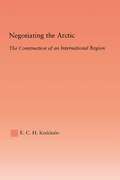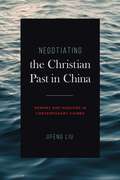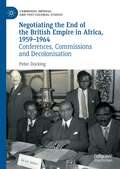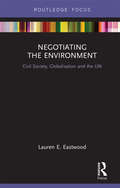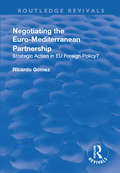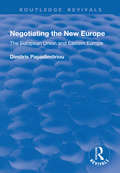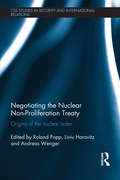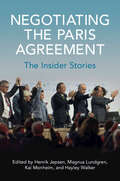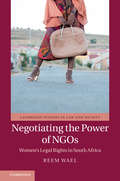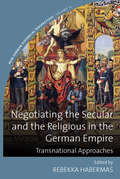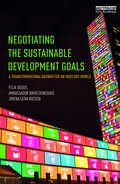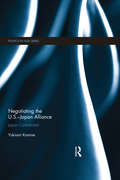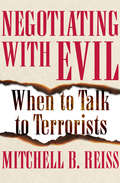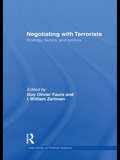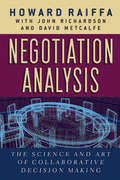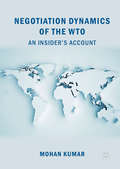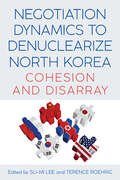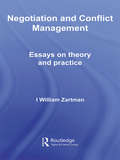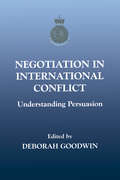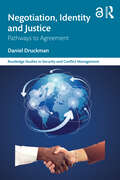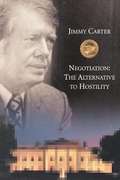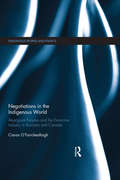- Table View
- List View
Negotiating the Arctic: The Construction of an International Region (Studies in International Relations)
by E.C.H KeskitaloThis work draws upon the history of Arctic development and the view of the Arctic in different states to explain how such a discourse has manifested itself in current broader cooperation across eight statistics analysis based on organization developments from the late 1970s to the present, shows that international region discourse has largely been forwarded through the extensive role of North American, particularly Canadian, networks and deriving form their frontier-based conceptualization of the north.
Negotiating the Christian Past in China: Memory and Missions in Contemporary Xiamen (World Christianity)
by Jifeng LiuAt the turn of the twenty-first century, Xiamen’s pursuit of World Heritage Site designation from UNESCO stimulated considerable interest in the city’s Christian past. History enthusiasts, both Christian and non-Christian, devoted themselves to reinterpreting the legacy of missionaries and challenged official narratives of Christianity’s troubled associations with Western imperialism. In this book, Jifeng Liu documents the tension that has inevitably emerged between the established official history and these popular efforts.This volume elucidates the ways in which Christianity has become an integral part of Xiamen, a Chinese city profoundly influenced by Western missionaries. Drawing on extensive interviews, locally produced histories, and observations of historical celebrations, Liu provides an intimate portrait of the people who navigate ideological issues to reconstruct a Christian past, reproduce religious histories, and redefine local power structures in the shadow of the state. Liu makes a compelling argument that a Christian past is being constructed that combines official frameworks, unofficial practices, and nostalgia into social memory, a realm of dynamic negotiation that is neither dominated by the authoritarian state nor characterized by popular resistance. In this way, Negotiating the Christian Past in China illustrates the complexities of memory and missions in shaping the city’s cultural landscape, church-state dynamics, and global aspirations.This groundbreaking study assumes a perspective of globalization and localization, in both the past and the present, to better understand Chinese Christianity in a local, national, and global context. It will be welcomed by scholars of religious studies and world Christianity, and by those interested in the church-state relationship in China.
Negotiating the Deal
by Christopher AlcantaraThis book provides the first systematic and comprehensive analysis of the factors that explain both completed and incomplete treaty negotiations between Aboriginal groups and the federal, provincial, and territorial governments of Canada. Since 1973, groups that have never signed treaties with the Crown have been invited to negotiate what the government calls "comprehensive land claims agreements," otherwise known as modern treaties, which formally transfer jurisdiction, ownership, and title over selected lands to Aboriginal signatories. Despite their importance, not all groups have completed such agreements - a situation that is problematic not only for governments but for Aboriginal groups interested in rebuilding their communities and economies.Using in-depth interviews with Indigenous, federal, provincial, and territorial officials, Christopher Alcantara compares the experiences of four Aboriginal groups: the Kwanlin Dün First Nation (with a completed treaty) and the Kaska Nations (with incomplete negotiations) in Yukon Territory, and the Inuit (completed) and Innu (incomplete) in Newfoundland and Labrador. Based on the experiences of these groups, Alcantara argues that scholars and policymakers need to pay greater attention to the institutional framework governing treaty negotiations and, most importantly, to the active role that Aboriginal groups play in these processes.
Negotiating the End of the British Empire in Africa, 1959-1964: Conferences, Commissions and Decolonisation (Cambridge Imperial and Post-Colonial Studies)
by Peter DockingThis book examines conferences and commissions held for British colonial territories in East and Central Africa in the early 1960s. Until 1960, the British and colonial governments regularly employed hard methods of colonial management in East and Central Africa, such as instituting states of emergency and imprisoning political leaders. A series of events at the end of the 1950s made hard measures no longer feasible, including criticism from the United Nations. As a result, softer measures became more prevalent, and the use of constitutional conferences and commissions became an increasingly important tool for the British government in seeking to manage colonial affairs.During the period 1960-64, a staggering sixteen conferences and ten constitutional commissions were held for British colonies in East and Central Africa. This book is the first of its kind to provide a detailed overview of how the British sought to make use of these events to control and manage the pace of change. The author also demonstrates how commissions and conferences helped shape politics and African popular opinion in the early 1960s. Whilst giving the British government temporary respite, conferences and commissions ultimately accelerated the decolonisation process by transferring more power to African political parties and engendering softer perceptions on both sides. Presenting both British and African perspectives, this book offers an innovative exploration into the way that these episodes played an important part in the decolonisation of Africa. It shows that far from being dry and technical events, conferences and commissions were occasions of drama that tell us much about how the British government and those in Africa engaged with the last days of empire.
Negotiating the Environment: Civil Society, Globalisation and the UN (Routledge Focus on Environment and Sustainability)
by Lauren E EastwoodCivil society participants have voiced concerns that the environmental problems that were the subject of multilateral environmental agreements negotiated during the 1992 Rio processes are not serving to ameliorate global environmental problems. These concerns raise significant questions regarding the utility of negotiating agreements through the UN. This book elucidates the complexity of how participants engage in these negotiations through the various processes that take place under the auspices of the UN—primarily those related to climate and biological diversity. By taking an ethnographic approach and providing concrete examples of how it is that civil society participants engage in making policy, this book develops a robust sense of the implications of the current terrain of policy-making—both for the environment, and for the continued participation of non-state actors in multilateral environmental governance. Using data gathered at actual negotiations, the book develops concepts such as participation and governance beyond theory. The research uses participant observation ethnographic methods to tie the theoretical frameworks to people’s actual activities as policy is generated and contested. Whereas topics associated with global environmental governance are traditionally addressed in fields such as international relations and political science, this book contributes to developing a richer understanding of the theories using a sociological framework, tying individual activities into larger social relations and shedding light on critical questions associated with transnational civil society and global politics.
Negotiating the Euro-Mediterranean Partnership: Strategic Action in EU Foreign Policy? (Routledge Revivals)
by Ricardo GomezThis title was first published in 2003. In this study Ricardo Gomez traces the origins of the external Mediterranean policy of the European Union (EU) and examines in detail the negotiations that shaped the policy and its impact. Combining historical analysis with case studies of the Euro-Med partnership initiative, EU policy on Algeria and the EU's involvement in the Middle East peace process, he covers a diverse array of issues that will appeal to scholars across a variety of sub-disciplines of political science and international relations.
Negotiating the New Europe: The European Union and Eastern Europe (Routledge Revivals)
by Dimitris PapadimitriouThis title was first published in 2002: Offering a new and challenging perspective on how the European Union (EU) sought to structure its relations with Central and Southeast Europe after the Cold War, this volume draws upon key debates in both politics and international relations. A historically and theoretically informed examination of the EU's engagement in Central and Eastern Europe since 1989, the book combines conceptual rigour with clear empirical analysis, firmly grounding the study of the European Union's current enlargement process in established theoretical perspectives. The book is written in an engaging and accessible way, which will appeal to academics, students and practitioners alike.
Negotiating the Nuclear Non-Proliferation Treaty: Origins of the Nuclear Order (CSS Studies in Security and International Relations)
by Andreas Wenger Roland Popp Liviu HorovitzThis volume offers a critical historical assessment of the negotiation of the Treaty on the Non-Proliferation of Nuclear Weapons (NPT) and of the origins of the nonproliferation regime. The NPT has been signed by 190 states and was indefinitely extended in 1995, rendering it the most successful arms control treaty in history. Nevertheless, little is known about the motivations and strategic calculi of the various middle and small powers in regard to their ultimate decision to join the treaty despite its discriminatory nature. While the NPT continues to be central to current nonproliferation efforts, its underlying mechanisms remain under-researched. Based on newly declassified archival sources and using previously inaccessible evidence, the contributions in this volume examine the underlying rationales of the specific positions taken by various states during the NPT negotiations. Starting from a critical appraisal of our current knowledge of the genesis of the nonproliferation regime, contributors from diverse national and disciplinary backgrounds focus on both European and non-European states in order to enrich our understanding of how the global nuclear order came into being. This book will be of much interest to students of nuclear proliferation, Cold War history, security studies and IR.
Negotiating the Paris Agreement: The Insider Stories
by Hayley WalkerThe 2015 Paris Agreement represents the culmination of years of intense negotiations under the United Nations Framework Convention on Climate Change. Designed to curb climate change, it was negotiated by almost 200 countries who came to the table with different backgrounds, perceptions and interests. As such, the Agreement represents a triumph for multilateralism in a period otherwise characterized by nationalist turns. How did countries reach the historical agreement, and what were the driving forces behind it? This book paints a full picture by providing and analysing multifaceted insider accounts from high-level delegates who represented developed and developing countries, civil society, businesses, the French Presidency, and the UNFCCC Secretariat. In doing so, the book documents not only the negotiation of the Paris Agreement but also the dynamics and factors that shaped it. A better understanding of these dynamics and factors can guide future negotiations and help us solve global challenges.
Negotiating the Power of NGOs: Women's Legal Rights in South Africa (Cambridge Studies in Law and Society)
by Reem WaelThis book focuses on the socio-political environment that allows for the impactful work of NGOs through their proximity to local communities. The book showcases how this space has helped South African women's rights NGOs to bring about crucial legal reforms, which are quite relevant to women's lived realities. Recognizing its limitations, the South African state encourages NGOs to work freely on the ground and with state institutions to ameliorate the conditions for women's rights. The outcome of this state-NGO dynamic can be seen in the numerous human rights gains achieved by NGOs in general, and by women's rights organizations specifically. In addition, vulnerable communities such as women living under customary law have a significantly better chance to access justice. The book then demonstrates the opposite scenario, using Egypt as a case study, where NGOs are viewed as a national threat, and consequently operate under restrictive rules.
Negotiating the Secular and the Religious in the German Empire: Transnational Approaches (New German Historical Perspectives #10)
by Rebekka HabermasWith its rapid industrialization, modernization, and gradual democratization, Imperial Germany has typically been understood in secular terms. However, religion and religious actors actually played crucial roles in the history of the Kaiserreich, a fact that becomes particularly evident when viewed through a transnational lens. In this volume, leading scholars of sociology, religious studies, and history study the interplay of secular and religious worldviews beyond the simple interrelation of practices and ideas. By exploring secular perspectives, belief systems, and rituals in a transnational context, they provide new ways of understanding how the borders between Imperial Germany’s secular and religious spheres were continually made and remade.
Negotiating the Secular and the Religious in the German Empire: Transnational Approaches (New German Historical Perspectives)
by Rebekka HabermasWith its rapid industrialization, modernization, and gradual democratization, Imperial Germany has typically been understood in secular terms. However, religion and religious actors actually played crucial roles in the history of the Kaiserreich, a fact that becomes particularly evident when viewed through a transnational lens. In this volume, leading scholars of sociology, religious studies, and history study the interplay of secular and religious worldviews beyond the simple interrelation of practices and ideas. By exploring secular perspectives, belief systems, and rituals in a transnational context, they provide new ways of understanding how the borders between Imperial Germany’s secular and religious spheres were continually made and remade.
Negotiating the Sustainable Development Goals: A transformational agenda for an insecure world
by Felix Dodds Ambassador David Donoghue Jimena Leiva RoeschThe Sustainable Development Goals (SDGs) are a universal set of seventeen goals and 169 targets, with accompanying indicators, which were agreed by UN member states to frame their policy agendas for the fifteen-year period from 2015 to 2030. Written by three authors who have been engaged in the development of the SDGs from the beginning, this book offers an insider view of the process and a unique entry into what will be seen as one of the most significant negotiations and global policy agendas of the twenty-first century. The book reviews how the SDGs were developed, what happened in key meetings and how this transformational agenda, which took more than three years to negotiate, came together in September 2015. It dissects and analyzes the meetings, organizations and individuals that played key roles in their development. It provides fascinating insights into the subtleties and challenges of high-level negotiation processes of governments and stakeholders, and into how the SDGs were debated, formulated and agreed. It is essential reading for all interested in the UN, sustainable development and the future of the planet and humankind.
Negotiating the U.S.–Japan Alliance: Japan Confidential (Politics in Asia)
by Yukinori KomineIn recent years, the U.S.–Japan alliance has marked several anniversaries, including 40 years since the 1969 decision on the reversion of Okinawa. These occasions have provided crucial opportunities to reassess the continuing significance of U.S.–Japan security and diplomatic relations, prompting this investigation into major issues in negotiations between the two countries. This book is the first comprehensive and comparative analysis of the U.S. and Japanese foreign policy formulation and implementation processes from 1961 to 1978, which also explores the long-term strategic significance of the U.S. deterrence in East Asia. It is based on numerous declassified and previously unused U.S. and Japanese documents, oral histories, and the author’s interviews with former officials. The book traces the origins of contemporary security and diplomatic issues back to the 1961–1978 U.S.–Japan negotiations involving secret arrangements in the reversion of Okinawa, Japan’s defense build-up, including the question of Japan’s nuclear option, and U.S.–Japan defense cooperation. Through a systematic assessment of the behind-the-scenes discussions, Dr Yukinori Komine demonstrates that external security calculations were consistently primary factors in U.S.–Japan relations. The book concludes by making policy-relevant suggestions, important for the "Pacific Century". This book offers crucial contributions to the ongoing debate regarding the increasing need for greater transparency and burden-sharing in the U.S.–Japan alliance. It will appeal to scholars and students of International Relations of the Asia-Pacific region, East Asia–U.S. relations, U.S. Politics and Japanese Politics, as well as Foreign Policy.
Negotiating with Evil: When to Talk to Terrorists
by Mitchell B. ReissIn a career spanning decades, Mitchell B. Reiss has been at the center of some of America&’s most sensitive diplomatic negotiations. He is internationally recognized for his negotiation efforts to forge peace in Northern Ireland and to stem the nuclear crisis in North Korea. In Negotiating with Evil, Reiss distills his experience to answer two questions more vital today than ever: Should we talk to terrorists? And if we do, how should we conduct the negotiations in order to gain what we want? To research this book, Reiss traveled the globe for three years, unearthing hidden aspects of the most secret and sensitive negotiations from recent history. He has interviewed hundreds of individuals, including prime ministers, generals, intelligence operatives, and former terrorists in conflict-torn regions of Europe, Asia, North Africa, and the Middle East. The result is a fascinating examination of the different methods countries have employed to confront terrorist movements, the mistakes made, the victories achieved, and the lessons learned. Negotiating with Evil is a penetrating and insightful look into high-stakes diplomacy in the post-9/11 world and a vital contribution to the global security debate as the United States and its allies struggle to confront terrorist threats abroad and at home.
Negotiating with Terrorists: Strategy, Tactics, and Politics (Political Violence)
by I. William Zartman Guy Olivier FaureThis edited volume addresses the important issue of negotiating with terrorists, and offers recommendations for best practice and processes. Hostage negotiation is the process of trying to align two often completely polarised parties. Authorities view hostage taking as unacceptable demands made by unacceptable means. However terrorists view their actions as completely justified, even on moral and religious grounds. If they are to try and reconcile these two sides, it is essential for hostage negotiators to understand terrorist culture, the hostage takers’ profiles, their personality, their view of the world and also the authorities, their values and their framing of the problem raised by the taking of hostages. Although not advocating negotiating with terrorists, the volume seeks to analyse when, why, and how it is done. Part I deals with the theory and quantifiable data produced from analysis of hostage situations, while Part II explores several high profile case studies and the lessons that can be learnt from them. This volume will be of great interest to students of terrorism studies, conflict management, negotiation, security studies and IR in general. I William Zartman is the Jacob Blaustein Distinguished Professor Emeritus of International Organization and Conflict Resolution and former Director of the Conflict Management and African Studies Programs, at the Paul H. Nitze School of Advanced International Studies, Johns Hopkins University, Washington, DC. He is a member of the Steering Committee of the Processes of International Negotiation (PIN) Program at the International Institute of Applied Systems Analysis (IIASA) in Laxenburg, Austria. He is author/editor of over 20 books on negotiation, conflict and mediation. Guy Olivier Faure is Professor of Sociology at the Sorbonne University, Paris I, and a member of the Steering Committee of the Processes of International Negotiation (PIN) Program at the International Institute of Applied Systems Analysis (IIASA) in Laxenburg, Austria. He has served as an advisor to French government on hostage negotiations.
Negotiation Analysis: The Science and Art of Collaborative Decision Making
by Howard RaiffaThis masterly book substantially extends Howard Raiffa’s earlier classic, The Art and Science of Negotiation. It does so by incorporating three additional supporting strands of inquiry: individual decision analysis, judgmental decision making, and game theory. Each strand is introduced and used in analyzing negotiations. The book starts by considering how analytically minded parties can generate joint gains and distribute them equitably by negotiating with full, open, truthful exchanges. The book then examines models that disengage step by step from that ideal. It also shows how a neutral outsider (intervenor) can help all negotiators by providing joint, neutral analysis of their problem. Although analytical in its approach—building from simple hypothetical examples—the book can be understood by those with only a high school background in mathematics. It therefore will have a broad relevance for both the theory and practice of negotiation analysis as it is applied to disputes that range from those between family members, business partners, and business competitors to those involving labor and management, environmentalists and developers, and nations.
Negotiation Dynamics of the WTO: An Insider's Account
by Mohan KumarThe book aims at informing and educating the public at large about the intricacies of the Negotiation Dynamics at the WTO. It traces the period from the launch of the Uruguay Round in 1986 to its conclusion at Marrakesh in 1994 and the subsequent entry into force of the WTO on 1 January 1995.The book shows how WTO Ministerial Conference in Seattle was doomed to fail and its failure led to “trust deficit” between the developed countries on the one hand and certain key developing and least-developed countries on the other. Thus tracing the WTO saga that began in the wake of the failure at Seattle and the difficult path that led to the launch of a new Round at Doha in November 2001.The book throws light on India’s domestic decision-making structure as well as some of the factors driving India’s negotiating stance at the WTO. It also describes the current impasse at the WTO and offers some ideas to revive an institution that is so crucial for the smooth functioning of the multilateral trading system.
Negotiation Dynamics to Denuclearize North Korea: Cohesion and Disarray
by Terence Roehrig Su-Mi LeeWas there ever a window of opportunity for successful negotiations over North Korea's nuclear weapons program? Negotiation Dynamics to Denuclearize North Korea brings together country experts with negotiation specialists to apply negotiation theory to the North Korea denuclearization process. Country expert chapters provide a detailed assessment of the goals, motives, and strategies of the six parties—North Korea, South Korea, the United States, China, Japan, and Russia—along with contextual variables of each player such as political, economic, and social conditions while the negotiation scholars collate and scrutinize the results of these key variables. Based on thorough descriptive contexts provided by the country experts, the negotiation scholars identify the lack of two factors, party cohesion and ripeness, as detriments to successful North Korea nuclear negotiations.
Negotiation and Conflict Management: Essays on Theory and Practice (Routledge Studies in Security and Conflict Management #Vol. 1)
by I. William ZartmanThis book presents a series of essays by I. William Zartman outlining the evolution of the key concepts required for the study of negotiation and conflict management, such as formula, ripeness, pre-negotiation, mediation, power, process, intractability, escalation, and order. Responding to a lack of useful conceptualization for the analysis of international negotiation, Zartman has developed an analytical framework and specific concepts that can serve as a basis for both study and practice. Negotiation is analyzed as a process, and is linked to other major themes in political science such as decision, structure, justice and order. This analysis is then applied to negotiations to manage particular types of conflicts and cooperation, including ethnic conflicts, civil wars and regime-building. It also develops typologies and strategies of mediation, dealing with such aspects as leverage, bias, interest, and roles. Written by the leading exponent of negotiation and mediation, Negotiation and Conflict Management will be of great interest to all students of negotiation, mediation and conflict studies in general.
Negotiation in International Conflict: Understanding Persuasion (The Sandhurst Conference Series #No. 4)
by Deborah Goodwin Matthew MidlaneThis work explores the application and structure of negotiation within existing international conflicts, and assesses the effectiveness, or otherwise, of such forms of dispute resolution. It examines the role of negotiation and the skills required by any practitioner in the field.
Negotiation, Identity and Justice: Pathways to Agreement (Routledge Studies in Security and Conflict Management)
by Daniel DruckmanThis volume presents contributions made by Daniel Druckman on the topics of negotiation, national identity, and justice. Containing research conducted and published over a half century, the volume is divided into seven thematic parts that cover: the multifaceted career, flexibility in negotiation, values and interests, turning points, national identity, and process and outcome justice. It rounds off with a reflective and forward-looking conclusion. Each part is prefaced with an introduction that highlights the chapters to follow. The chapters comprise empirical, theoretical, and state-of-the-art articles. These essays offer an array of research approaches, which include experiments, simulations, and case studies, with topics ranging from boundary roles and turning points in negotiation to nationalism and war, and the way that research is used in skills training for diplomats and in the development of government policies. In addition, the book provides rare glimpses of behind-the-scenes networks, sponsors, and events, with personal stories that also make evident that there is more to a career than what appears in print. The articles chosen for inclusion are a small set of the total number of career publications by the author but are the ones that made a substantial impact in their respective fields. The concluding section looks back at how the author’s career connects to classical ideas and the value of an evidence-based approach to scholarship and practice. It also looks forward to directions for future research in six areas. This book will be of considerable interest to students of international negotiation, conflict resolution, security studies, and international relations.
Negotiation, Identity and Justice: Pathways to Agreement (Routledge Studies in Security and Conflict Management)
by Daniel DruckmanThis volume presents contributions made by Daniel Druckman on the topics of negotiation, national identity, and justice.Containing research conducted and published over a half century, the volume is divided into seven thematic parts that cover: the multifaceted career, flexibility in negotiation, values and interests, turning points, national identity, and process and outcome justice. It rounds off with a reflective and forward-looking conclusion. Each part is prefaced with an introduction that highlights the chapters to follow.The chapters comprise empirical, theoretical, and state-of-the-art articles. These essays offer an array of research approaches, which include experiments, simulations, and case studies, with topics ranging from boundary roles and turning points in negotiation to nationalism and war, and the way that research is used in skills training for diplomats and in the development of government policies. In addition, the book provides rare glimpses of behind-the-scenes networks, sponsors, and events, with personal stories that also make evident that there is more to a career than what appears in print. The articles chosen for inclusion are a small set of the total number of career publications by the author but are the ones that made a substantial impact in their respective fields. The concluding section looks back at how the author’s career connects to classical ideas and the value of an evidence-based approach to scholarship and practice. It also looks forward to directions for future research in six areas.This book will be of considerable interest to students of international negotiation, conflict resolution, security studies, and international relations.Chapter 16 of this book is freely available as a downloadable Open Access PDF at http://www.taylorfrancis.com under a Creative Commons Attribution-Non Commercial-No Derivatives (CC-BY-NC-ND) 4.0 license.
Negotiation: The Alternative to Hostility
by Jimmy CarterThis first address of the Carl Vinson Memorial Lecture Series at Mercer University is a masterful assessment of the difficulties of resolving disputes. President Carter's guidelines for establishing a more stable peace in the world are concise and imaginative without sacrificing their essential practicality.
Negotiations in the Indigenous World: Aboriginal Peoples and the Extractive Industry in Australia and Canada (Indigenous Peoples and Politics)
by Ciaran O'FaircheallaighNegotiated agreements play a critical role in setting the conditions under which resource development occurs on Indigenous land. Our understanding of what determines the outcomes of negotiations between Indigenous peoples and commercial interests is very limited. With over two decades experience with Indigenous organisations and communities, Ciaran O’Faircheallaigh's book offers the first systematic analysis of agreement outcomes and the factors that shape them, based on evaluative criteria developed especially for this study; on an analysis of 45 negotiations between Aboriginal peoples and mining companies across all of Australia’s major resource-producing regions; and on detailed case studies of four negotiations in Australia and Canada.
